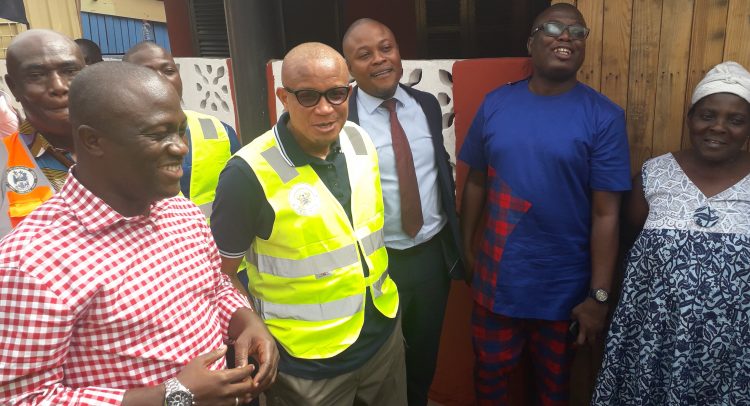Dr. Hamid inspecting the facility during the tour
Some beneficiaries of an inner cities sanitation project initiated by the Ministry of Inner Cities and Zongo Development (MICZD) have commended government for its wisdom in setting up a ministry that caters for the marginalized section of the Ghanaian society.
The project, which was executed under the Greater Accra Metropolitan Area (GAMA) Water and Sanitation Project, targeted 5000 beneficiaries who have been provided with toilet facilities.
The cost was borne by a World Bank subsided arrangement and the ministry.
Beneficiary communities included Chorkor, Adabraka, Chemue Naa, Osu Alata, Osu Anorhor, London Market, Akumadjen, Adedantan and Amamomo.
The sector minister, Dr. Mustapha Hamid, on Monday embarked on an inspection tour of completed facilities where scores of beneficiaries expressed gratitude to President Akufo-Addo.
Speaking in an interview, a beneficiary, Ahmed Bill, who resides at Chorkor, said that some residents had in the past resorted to open defecation along the coastal beaches in the absence of a household toilet facility.
He was, however, hopeful that such condemnable acts would be a thing of the past as beneficiaries would make optimum use of the facility.
Another beneficiary at Osu Alata, Sammy Odoi, stressed “we shouldn’t politicise things. Things for Ghanaians are for Ghanaians. It is not for NPP; it is not for NDC or PPP. So whatever we are doing, let’s do it from our heart.”
Dr. Hamid, who was accompanied by the Chief Executive Officer (CEO) of the Accra Metropolitan Assembly (AMA), Mohammed Adjei Sowah, encouraged beneficiaries to take proper care of the facilities as the ministry intends to increase the number of facilities in each household from one to two or more in subsequent years.
In selecting households for the project, Mr. Sowah explained that assessing the needs of households was conducted where households with large numbers who do not have a toilet facility were prioritized, while households willing to let out space for the project were also considered.
By Issah Mohammed

